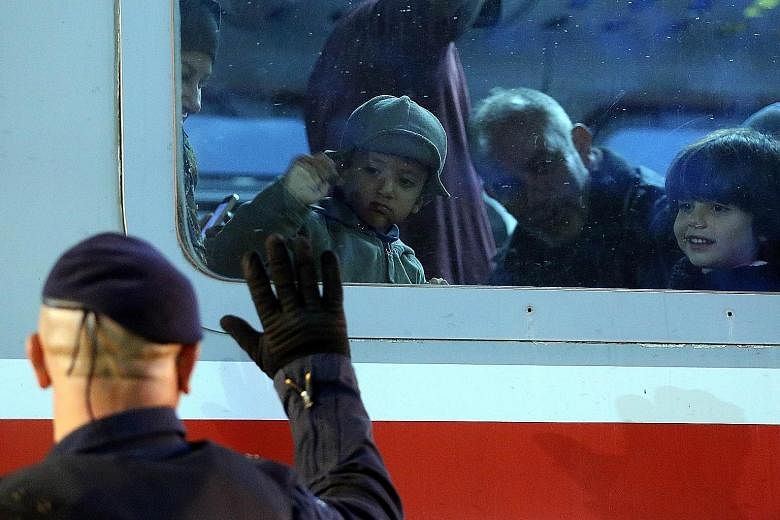BRUSSELS • European Union leaders held an emergency migration summit yesterday amid a growing east-west split after ministers forced through a controversial deal to relocate 120,000 refugees.
Overriding opposition from Eastern European states, interior ministers approved plans on Tuesday that require all to take their share of the hundreds of thousands of migrants who have overwhelmed front-line states such as Greece and Italy.
But in a rare step, the deal was passed by majority vote instead of unanimously, highlighting sharp and growing divisions in the 28-nation bloc on how to tackle the worst migration crisis since World War II.
Hungary, the Czech Republic, Romania and Slovakia voted against the relocation plan while Finland abstained, arguing that Brussels has no right to make them take people in.
EU Migration and Home Affairs Commissioner Dimitris Avramopoulos rejected any suggestion that the outcome did more harm than good, insisting that all member states were now on board. "On the contrary, it is a victory for the EU and for all member states," Mr Avramopoulos said yesterday as he arrived for talks with officials before the leaders summit. "We are determined to work closely with all member states."
In Bratislava, Slovakian Prime Minister Robert Fico said he was prepared to break the EU's rules rather than accept the proposal. "I would rather go to an infringement than to accept this diktat," he said, quoted by Slovakia's leading SME daily. The country said it will go to court to challenge the migrant quotas. "Very soon we will find that the emperor is naked. Common sense has lost today!" Czech Interior Minister Milan Chovanec tweeted after the vote.
Yesterday's summit focused on the next steps to take, mainly strengthening the bloc's external borders and providing extra funds for Turkey, Jordan, Lebanon and UN agencies to stem the flow of migrants. Any summit decision must be unanimous under EU rules, unlike decisions taken at the level of ministers.
Europe is under increasing pressure over its handling of a huge influx of hundreds of thousand of migrants this year, many of them fleeing conflict and repression in Syria, Afghanistan and Eritrea. US President Barack Obama pressed European nations on Tuesday to take their "fair share" of refugees. The statement is likely to be seen as a warning to those who opposed the deal.
But Mr Obama also faces charges that Washington has not done enough to address the crisis. The US has promised to take in only 10,000 as refugees next year - a figure dwarfed by the up to one million Syrian refugees Germany is expecting to welcome this year alone.
Officials said the relocation deal covered 66,000 refugees who would be moved from Greece and Italy to other EU countries, plus another 54,000 who had previously been earmarked to be relocated from Hungary before it refused to back the plan.
It also involves the creation of "hot spots" - special centres in front-line states for receiving and processing asylum seekers and separating economic migrants from genuine refugees fleeing conflict.
Meanwhile. more than 2,500 people, mainly Afghan refugees, arrived on the Greek island of Lesbos yesterday morning in the space of three hours, with more on the way. About 40 rubber dinghies each carrying 60 to 70 people arrived in the rain on one beach on the island, with nine more boats seen in the distance.
AGENCE FRANCE-PRESSE, REUTERS

